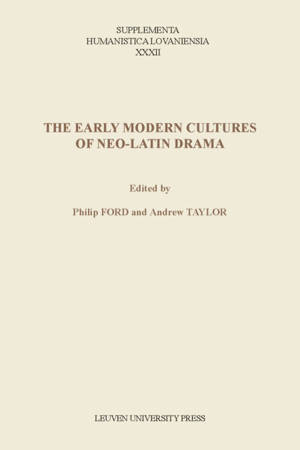
- Afhalen na 1 uur in een winkel met voorraad
- Gratis thuislevering in België vanaf € 30
- Ruim aanbod met 7 miljoen producten
- Afhalen na 1 uur in een winkel met voorraad
- Gratis thuislevering in België vanaf € 30
- Ruim aanbod met 7 miljoen producten
Zoeken
The early modern cultures of Neo-Latin drama E-BOOK
€ 37,50
+ 37 punten
Omschrijving
The vitality and power of expression of Neo-Latin Drama.
The essays in this collection all illustrate the vitality of Neo-Latin drama in early modern Europe, arising from its productive combination of classical models with deep-rooted vernacular traditions. While the plays were often composed in the context of a school or university setting, the dramatists seldom neglected the need to appeal to a broad audience, including non-Latinists. Yet the use of Latin, and the ambiguity of a plurivocal literary form, allowed the authors of these plays to introduce messages and ideas which could be subversive of the prevailing political and religious authorities. At the same time, humanist colleges, and their Jesuit successors, were quick to see the educational advantages to be derived from staging plays performed by pupils, which had the advantage of acting as powerful advertisements for the schools. Neo-Latin drama in all its forms offered a freedom of expression and form which is rare in other Renaissance literary genres.
Contributors:
J. Pascual Barea (Universidad de Cádiz), J. Bloemendal (Huygens Institute, KNAW, The Hague), E. Borza (Université catholique de Louvain), J. De Landtsheer (University of Leuven), A. Eyffinger (Huygens Institute, KNAW, The Hague), C. Ferradou (Université de Provence), S. Knight (University of Leicester), J. Loach (Cardiff University), H. B. Norland (University of Nebraska, Lincoln), V. Coroleu Oberparleiter (University of Salzburg), O. Pédeflous (Paris IV and Institut Thiers), C. Ryan (Merton College, Oxford), M. Verweij (Royal Library of Belgium).
The essays in this collection all illustrate the vitality of Neo-Latin drama in early modern Europe, arising from its productive combination of classical models with deep-rooted vernacular traditions. While the plays were often composed in the context of a school or university setting, the dramatists seldom neglected the need to appeal to a broad audience, including non-Latinists. Yet the use of Latin, and the ambiguity of a plurivocal literary form, allowed the authors of these plays to introduce messages and ideas which could be subversive of the prevailing political and religious authorities. At the same time, humanist colleges, and their Jesuit successors, were quick to see the educational advantages to be derived from staging plays performed by pupils, which had the advantage of acting as powerful advertisements for the schools. Neo-Latin drama in all its forms offered a freedom of expression and form which is rare in other Renaissance literary genres.
Contributors:
J. Pascual Barea (Universidad de Cádiz), J. Bloemendal (Huygens Institute, KNAW, The Hague), E. Borza (Université catholique de Louvain), J. De Landtsheer (University of Leuven), A. Eyffinger (Huygens Institute, KNAW, The Hague), C. Ferradou (Université de Provence), S. Knight (University of Leicester), J. Loach (Cardiff University), H. B. Norland (University of Nebraska, Lincoln), V. Coroleu Oberparleiter (University of Salzburg), O. Pédeflous (Paris IV and Institut Thiers), C. Ryan (Merton College, Oxford), M. Verweij (Royal Library of Belgium).
Specificaties
Betrokkenen
- Uitgeverij:
Inhoud
- Aantal bladzijden:
- 232
- Taal:
- Engels
- Reeks:
Eigenschappen
- Productcode (EAN):
- 9789461661289
- Verschijningsdatum:
- 14/04/2017
- Uitvoering:
- E-book
- Beveiligd met:
- Digital watermarking
- Formaat:

Alleen bij Standaard Boekhandel
+ 37 punten op je klantenkaart van Standaard Boekhandel
Beoordelingen
We publiceren alleen reviews die voldoen aan de voorwaarden voor reviews. Bekijk onze voorwaarden voor reviews.







